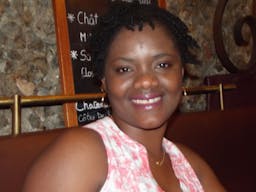IN FRONT OF THE CRISIS LINE
Jan 21, 2015
Story
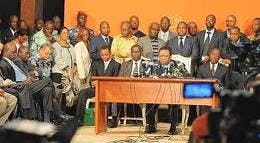
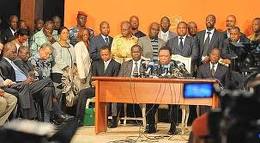
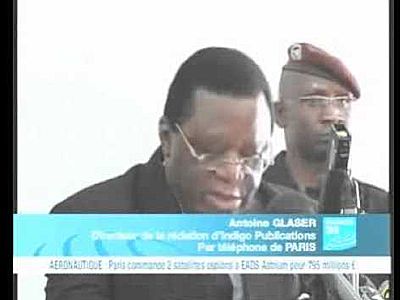
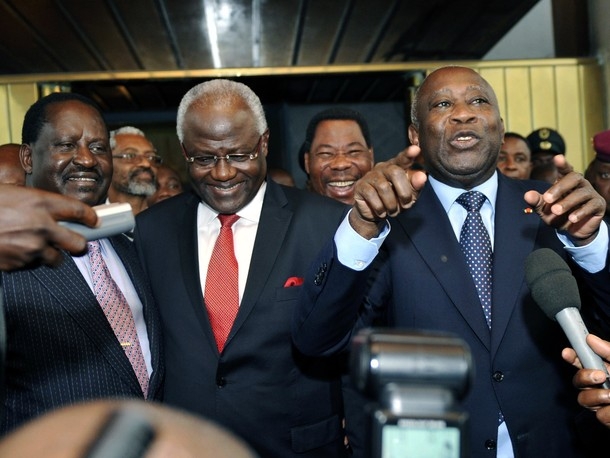
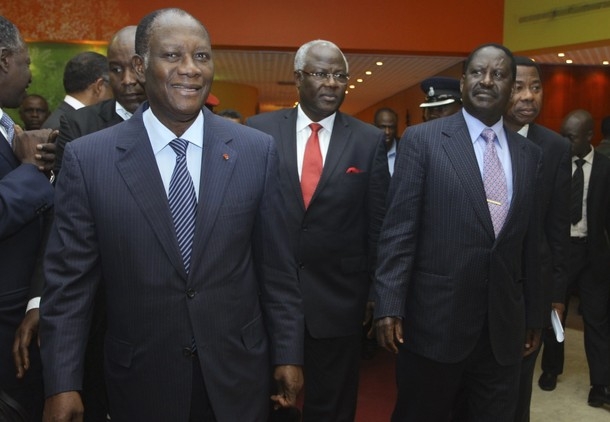
That morning brought a smile to my face: It was the opening of the presidential campaign for Cote d’Ivoire. Politics is not something I had often enquired about. I would skim the headlines, only paying attention to the top news stories. But this year is different. Since the military coup of 24 December 1999 against former President Henri Konan Bédié, my country has been embroiled in several violent movements and a further coup attempt after the election in 2000, won by Laurent Gbagbo, who remains in power—albeit disputed—today. This year’s election had filled my country with the hope of reunification after eight years of division between the northern and southern parts of Cote d’Ivoire. There was even a female candidate on the ballot; she caught my attention, bringing forth an interest in politics that I had not known existed in me. The excitement and hope I felt that day has since turned into sadness, fear and uncertainty as Gbagbo and presidential hopeful Alassane Ouattara are both claiming the presidency. I don’t know what to think, what to believe… I am so confused…
Part of me wishes I never laid my eyes upon Jacqueline Oble’s election poster. The hope I felt for this female candidate running for president in October was later replaced by disillusion and confusion in my heart. After an entire election campaign fraught with tension, I hoped that calm would settle over my country as the election results were announced. It did not happen that way, though, and my dreams have turned into the nightmare of my present reality.
On 1 December 2010 the president of the Independent Electoral Commission (CEI), Youssouf Bakayoko, said “it was not yet midnight,” and thus the results were not ready. I knew in my heart something was wrong as the time was already 11:42 p.m. The CEI should have reached consensus three days after the election, but I knew in the next eight minutes that a definitive answer would not emerge. I suddenly felt fear taking over my body, but I told myself: “believe and be positive.”
Rumours began to emerge that the results were tainted by fraud, that the CEI could not explain certain results and that challenger Ouattara was the winner. I switched my phone off to avoid having a heart attack.
The whole country was quiet for three days. Abidjan was so empty that even in Adjame-Liberté—where the hum of traffic is usually constant—there were barely five cars. Children did not go to school for about a month and only financial institutions and some governmental offices remained opened. The atmosphere was scary.
When in 1999 the Armed Forces and their former leader, General Robert Guei, took power, we all congratulated them, legitimating the use of violence to claim power in our country. We thought it was the best option even though people died. Later, in 2000, again my countrymen and women lost their lives in the name of democracy. I was very disturbed by all these killing and bloodshed. The Côte d’Ivoire I know was a country of peace. I could not understand the spell we were living under and how we allowed a failed coup attempt in 2002 to divide our country into two. For the past eight years we have lost ourselves in a world of fighting, killing, rapes and child soldiers. When people stayed in their house, it was because of fear—fear to die, to be injured, raped or beaten.
Today we cannot trace the real figures of human lives lost. Some speak of a mass grave of 300 people in Yopougon-Abidjan; another 2,000 died in the north and a portion of the centre of the country. Confusion and fear is what we are living. After two rounds of the election this year, the United Nations recently reported that, “Gbagbo still controls government buildings, state television and the security forces, while Ouattara remains trapped in the lagoon-side of the Golf Hotel, under guard of U.N. troops. He has set up a rival government with international (UN, France, African Union and ECOWAS) backing, but no power.”
We are facing this situation because, in my view, CEI President Bakayoko was not brave enough to resist various political pressures. Proclaiming that Ouattara has won, without the consensus of the other members, was the greatest mistake he could make; he even plunged us more deeply into division by making his announcement from Ouattara’s headquarters.
I am so disappointed with my country that it is difficult for me to trust our leaders again. Today, Bakayoko is in France with his whole family while we are suffering. Blame is on the Constitutional Council for not validating Bakayoko’s announcement that Ouattara is the winner, but how could they give credit to these results when such a careless attitude was applied to these sensitive proceedings? If the Constitutional Council says Gbagbo has won, while Bakayoko says Ouattara is the winner, who is the new president, whose decision is irrevocable? Whose word is the last one? I have never seen any international law being applied in such a case—no country’s past can help us understand. How should I know what to believe, what is right, what is just?
Gbagbo is not my relative, neither is Ouattara and I am not ready to fight for them. But this cannot continue. I tried understanding where the problem was, but I could not. I discussed this division with my countrymen and women, who displayed a variety of emotions: discouraged, ashamed, angry, passionate, fed-up and tired. They only increased my fear of civil war.
Could Gbagbo think of our lives, and denounce his power for the sake of peace? According to some of my fellow Ivorians, Mrs. A.A, Mr. S.R, Mr A.N, Ouattara is the president. Gbagbo has only one thing to do: be a good democrat and give up his power. They see that he now understands that power is sweet, and wishes to overstay his welcome. But what good can Gbagbo do for us? In 10 years all he succeeded in accomplishing is poverty, bloodshed and embezzlement. While people are dying, he sticks to his presidential seat, fighting only for that. Mr. T.P. believes Gbagbo made sure his friends were installed at the Constitutional Council to sway the voting in his direction: “No where it is stated that the Constitutional Council has power to cancel part of the country’s ballots, so why should they do it? It is because their friend lost. But the world is watching.”
A moderate solution will be to ask for both Gbagbo and Ouattara to leave the presidency they are claiming. Miss K.L is so annoyed she wants a transitory government, military or civilian, without these two men. Some even want their death. K.C. believes that if they are not dead, Gbagbo and Ouattara will continue to stir up people to support them and will worry our peace and development. Today, I do not watch TV except cartoons. The local channel runs continuous stories on Gbagbo, with people explaining why they think he has won; the foreign news channels keep me worrying the whole night, with reports on rebel leader and Ouattara’s Prime Minister Soro Guillaume’s ultimatums. We are tired of all this. They should stop using us for their game, stop counting dead people as trophies. People are suffering in their hearts.
Could Ouattara accept that he trafficked ballots with the help of rebels in the north and leave his quest for the presidency? Mrs. N. is ready to die instead of having Ouattara run the country. For Mrs. B.C., she believes Ouattara brought rebels to kill us to gain power, so why not kill all the Ivorians so he can rule, she asks. For Mrs. D.R., the international community is backing Ouattara because their interests align with his winning. Furthermore, the president of the CEI, without informing others, went on television to cancel all ballots in France, because eight voting centres had problems, simply because Gbagbo won in France says M.A.P. Gbagbo wants the CEI to re-count the votes, but they and other international observers refuse. Today the rebels are eating with Ouattara, my neighbours say, threatening us and the whole world is applauding.
I blame the U.N., France, the international community, the Economic Community of West African States, the African Union and all the political party leaders in Cote d’Ivoire. I blame them because they knew that having this election with armed rebels occupying the north would end like this. But they encouraged us and even urged to do so. This election has done nothing but strengthen and solidify the divide between the north and the south. No one cares for our lives.
Today I cannot talk with people. I don’t know what is in a person’s heart. A friend of mine called me pro-Gbagbo; another one nearly fought with her husband because he was upset that Ouattara called for all Ivorians to stop paying taxes and boycott work. Brothers cannot discuss our fragmented politics; some people are not attending church, others are forbidden to enter mosques—all in the name of politics.
While I was hoping that the Economic Community of West African States and the African Union could help in pacifist ways after their delegation missions in late December and early January, they have failed me with their willingness to engage in violence to instate their “right” winner. The whole world has signed “our death sentence,” deciding to send 2,000 U.N. soldiers with 2,000 Economic Community of West African States soldiers added to the rebels already in place to dislodge Gbagbo. I am very scared. We know that we may die very soon. The rebels and other pro-Ouattara supporters are already clashing violently in Anyama and Abobo with the police. Trash is burning in front of stores, men are arming themselves, women and children are fearful to leave their homes. Many see the darkness of civil war taking hold of our country once again.
A solution is not easy to see. The talk from my neighbours and the international community only confuse my thoughts. So I resort to what I loved and relied on as a child to help me sort things out: mathematics.
All registered voters totalled 5,700,000. For the second round of voting we had 70 percent participation, making 3,990,000 voters total.
The results given by Bakayoko are:
Gbagbo Laurent: 2,107,055 votes, 45.32%
Alassane Ouattara: 2,483,164 votes, 54.68%
It is truly amazing that we gathered 100 percent of the ballots; none came back as invalid or blank!
Later it was reported that 4,590,219 ballets were collected, meaning 80.53 percent of the 5,700,000 registered voters. How did we move from 3,990,000 voters to 4,590,219 ballots?
Either the first percentage was wrong or one of the runners’ ballot boxes was deliberately increased. Whose results should we take the extra 600,219 ballots from?
Only Gbagbo complained about the results. But why did the Constitutional Council give their results so quickly? Why was there no explanation or thought to a new round of elections? It pains me to think that this situation is happening because of a simple mathematical miss-calculation.
I am just looking for explanations, trying to understand what went on… But who will explain this mess to me?
Not the international community as they decided from the beginning to bring soldiers. They think they are our saviours, but they do not feel the pain we feel. Not the African Union or the West African community, as they are more concerned about signatures on bank accounts and seat shares.
Other African countries have contested leaders—Burkina-Faso President Blaise Compaoré has been president since a military coup in 1987 and has always been re-elected at more than 80 percent; in Togo, after president Eyadema’s death, his son took control with disputed election results and continues to reign today; another election riddled with grievances saw Bongo’s son take the reins in Gabon after his death without interference from the outside; Senegal saw their president try to re-write the constitution so he could rule a third term, but instead decided to institute his son as president after the people protested his constitutional re-write. All of those countries struggled through less than perfect election results, but none received the level of interference from the international community that Côte d’Ivoire has endured.
Why this different treatment? Is Côte d’Ivoire so much worse? Why this sudden eagerness for violence? I now doubt the real motivation is democracy. Possibly my previous aversion to politics has hindered my understanding, but I cannot believe forced violence is the answer.
Rwanda, Angola, Congo and Liberia are all recovering from atrocities and painful destruction…through discussion. If that is the case, why don’t we sit down, negotiate and discuss, straight from the beginning and save our poor lives?
We are not asking for money, not for food to fall from the sky. We want our lives spared and to live to resolve our problems one by one. Already almost 250 of my countrymen are dead, but will we be able to count again when they start their assault?
Who is listening to us? Who thinks of the children being exposed to guns, drugs, violence, rape, division and threats to their education and rights? Who cares for all the women losing children and husbands, struggling to feed their families? I am no longer scared: I am just waiting for the angel of death to start her work, increasing the numbers of orphans, widows, victims and disabled, throwing us 10 years back on our path to development.
This article is part of a writing assignment for Voices of Our Future, which is providing rigorous web 2.0 and new media training for 30 emerging women leaders. We are speaking out for social change from some of the most unheard regions of the world.
